Blog Archives
What Happened Today at the Monastery?
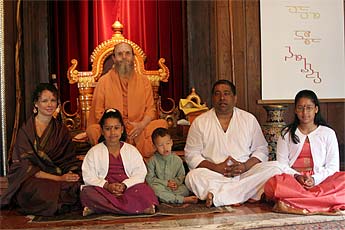
We had a very dynamic, “jam packed” morning today at the Aadheenam.
Here is the second and third generation Mardemootoo family, Kulapati Sivakumaran, Kulamata Kavita and children, eldest daughter on the right, Basanti, second daughter Dipanjali with her mother and youngest, son, Jayendra. They have traveled all the way from Mauritius to be here with Kavita’s parents (Amala and Deva Seyon) and have some quality time as a family together at the Aadheenam. Here they meet with Bodhinatha.
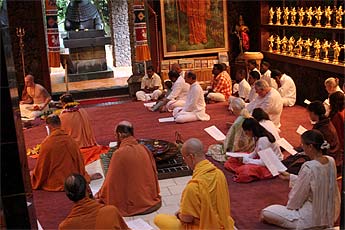
Chitra puja arrived today and was celebrated early in the morning.
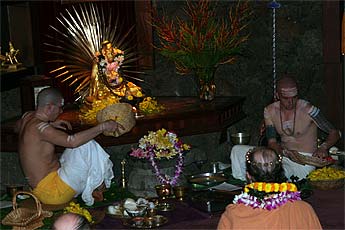
Sadhaka Jivanandanatha and Sadhaka Nilakantha perform the puja.
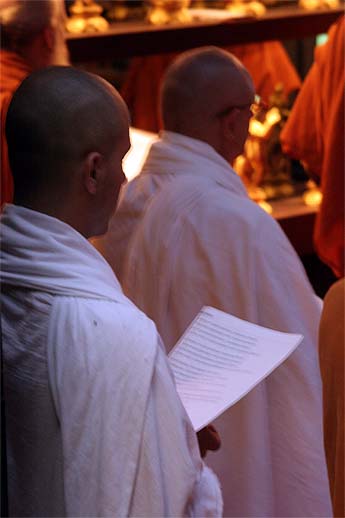
Chanting the Pushpam chant…
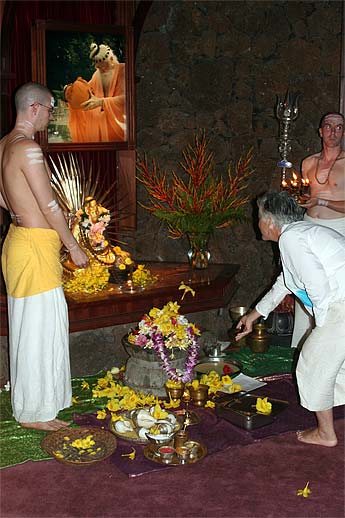
One of the devotees writes:
“This morning the 6 am Chitra pada puja was so blissful, spiritual, and peacefully serene. It makes one feel profoundly grateful and truly blessed that we are devotees of this great lineage of Sat Siva Gurus!”
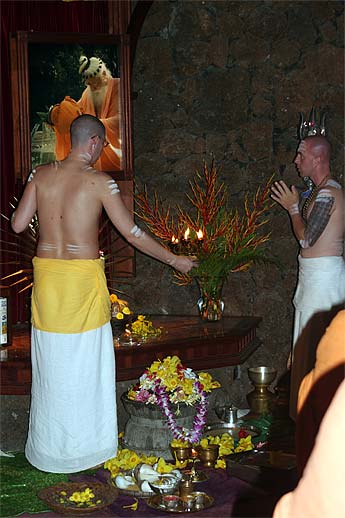
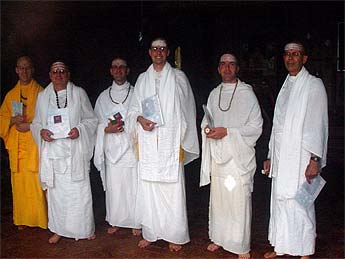
Later at the end of the morning just before lunch we had the extremely auspicious, “mangalam” vow renewals for seven monastics.
You can see a short video clip below. Sadhaka Jothinatha was there, too.
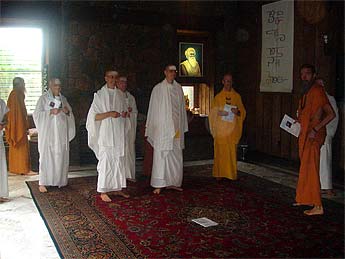
Each brought his vow book to the Guru Peedam.

Prostrating to Bodhinatha before the ceremony.
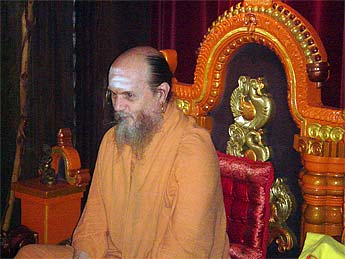
Bodhinatha talks of the importance of the vows, which for sadhakas and yogis are for two years at a time.

Acharya Kumarswami conducts the ceremony as they all in unison speak out their solemn pledge to follow the sacred vows of the Saiva monastic: Humility, Purity, Obedience and Confidence
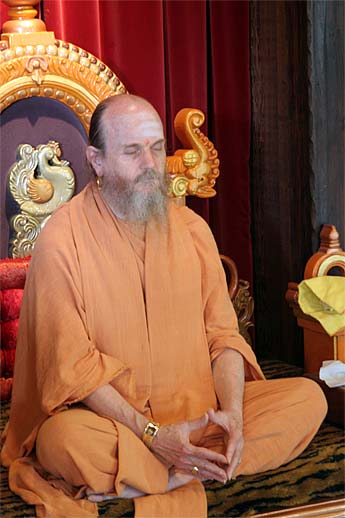
Bodhinatha listens as the vows are recited. They speak directly of the aspirations and committments of the soul for the highest attainments of human birth.
THE SACRED VOW OF HUMILITY: KNOWN IN TAMIL AS PANNIVU.
Humility is the state of profound maturity in which the soul, immersed in the depths of understanding and compassion, radiates the qualities of mildness, modesty, reverent obeisance and unpretentiousness. There is an analogy in the Iaivite tradition that compares the unfolding soul to wheat. When young and growing, the stalks of wheat stand tall and proud, but when mature their heads bend low under the weight of the grains they yield. Similarly, man is self-assertive, arrogant and vain only in the early stages of his spiritual growth. As he matures and yields the harvest of divine knowledge, he too bends his head. In the Tamil language this absence of pride or self-assertion is known as pannivu. Pannivu also means “jewel.” In the Holy Kural it is said that “Humility and pleasant words are the jewels that adorn a man; there are none other.”
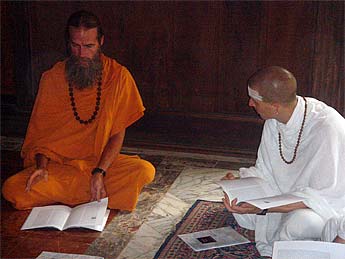
Signatures are placed in the book to signify another two years of service to Lord Siva and to the Sivaguru.
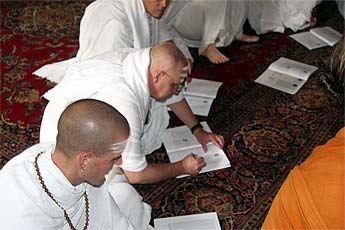
THE SACRED VOW OF PURITY: KNOWN IN TAMIL AS TIRIKARANNASUTTI.
Purity is the pristine and natural state of the soul. It is not something which the sannyasin attains as much as that which he already is, and which becomes evident as the layers of adulterating experience and beclouding conceptions are dissipated. Purity is clarity and clearness in all dimensions of being–physical, mental and emotional. It is innocence as opposed to familiarity with the ways of the world. It is, for sannyasins, the observance of chastity, called brahmacharya. In Tamil purity is given its fullest expression in the term tirikarannasutti, which means –purity in mind, speech and body. These three also called thought, word and deed –convey the amplitude of the ideal of purity.
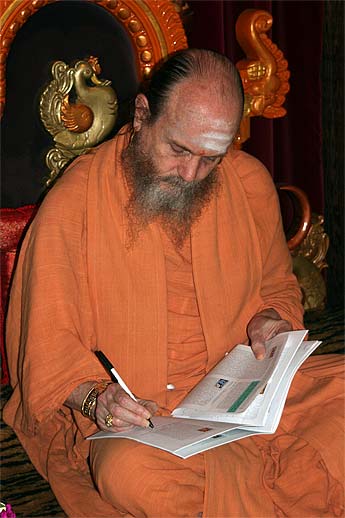
Then Bodhinatha signs each book as well.
SACRED VOW OF OBEDIENCE: KNOWN IN TAMIL AS TAALVU ENUM TANMAI.
Obedience is the state of willingness and cooperation in which the soul remains open and amenable to enlightened direction. For the sannyasin it is an unbroken pledge of trust in and surrender to the satguru, the Iiva Yogaswami Guru Parampara and the mystic process of spiritual evolution. In the Tamil language this definition of obedience is expressed in the term taalvu enum tanmai, which denotes “the quality or state of humble submission.” PObedience does not consist in blind submission and yielding to authority, nor in weakening our own will that it may be dominated by the will of another. Yet it is, in another sense, submission to a sacred purpose and the divine authority of the Second and Third Worlds. It is, for the sannyasin, an inner quality that allows him to remain consciously tractable and responsive. At those times when the instinctive nature looms strong and there arises a sense of “I” and “mine,” obedience is a surrendering of the ego to the soul or the instinctive nature to the spiritual nature. As long as the ego dominates the life of man, he will experience obedience as capitulation or subjection. As the soul unfolds and separateness is replaced by knowledge of the unity that pervades the universe, obedience is perceived as the union of minds and purpose, a state of harmony so complete that there can exist no distinction between him who gives and him who receives instruction or direction. True obedience is based on agreement, trust and knowledge, as opposed to passive servility, nonresistance or domination which have ignorance and fear as their basis.

THE SACRED VOW OF CONFIDENCE: KNOWN IN TAMIL AS RAHASIYAM.
Confidence is the state of trust in which the sacred teachings and sensitive or personal matters are not divulged to others. Spiritual instructions must be protected and preserved by those to whom they are entrusted, never wantonly or indiscriminately revealed. When we confide in another, we do so with the assurance that sensitive and serious information will not be inappropriately disclosed. In the Tamil language confidence is known as rahasiyam, meaning “secret or mystery.”
Confidence as applied to these Holy Orders does not mean “certainty” or “a belief in one’s abilities” or “self-confidence.” Rather, it is a confiding, a trusting and a relying upon. It is the sharing of privileged teachings or information that should not be disclosed, but held in confidentiality. In its most simple form it is the keeping of a secret.

You can see Gurudeva’s signature here in this book for Sadhaka Nilakantha who begain in 1999.
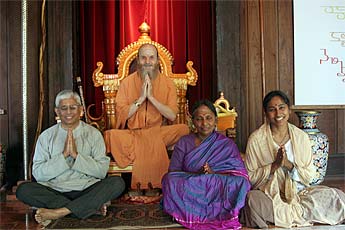
Our pilgrim family, the Umakants, Jeremiah and Padminidevi and their daughter Janani were blessed to have a private audience with Bodhinatha in the Guru Peedam. One could see how truly happy they all were following their meeting with the Guru.
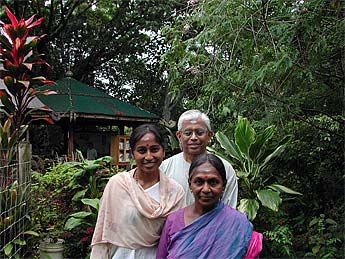
Just one last photo of them as they departed.
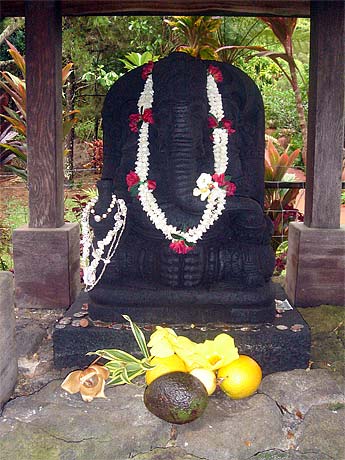
Jai Ganesha we start a morning walk at the beginning of Tiruneri.

who guides us always along the right path!

Visitors came as usual today even though it was quite rainy.
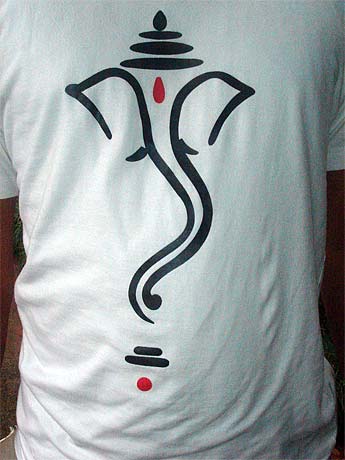
One of them wore this modern Ganesha t-shirt.
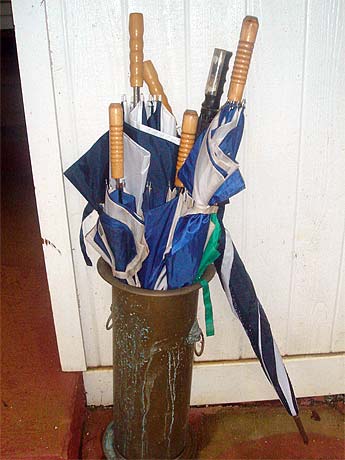
All of them needed umbrellas.
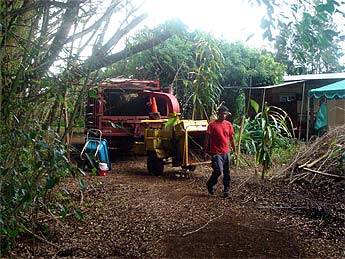
Some tree trimming today.

And Yogi Japendranatha working with the local network provider to solve some problems caused by wires wearing in the trees.

Rain is a blessing and we were certainly blessed last night and throughout the early morning hours.
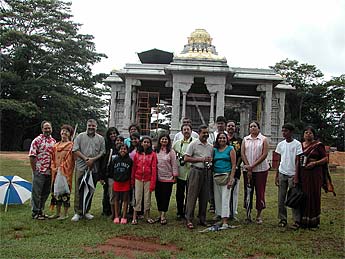
Following a powerful abhishekam in Kadavul Siva Temple, our group pilgrimaged down to the Iraivan Temple.
The entire group posed for a photo in front of the Iraivan Temple.
And of course there are lots of wonderful things that have been unloaded from the containers from India. Here’s a short clip of that work in action.
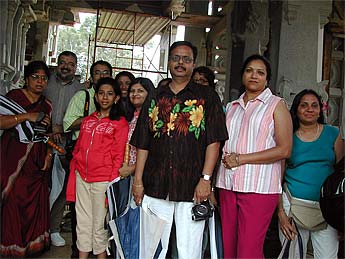
Raj and Himani Dave arrived for the morning abhishekam with their two children Rachna (age 15) and Sivani (age 12). Another family, Geeta and Raj Moolchnadani and their three children, Divya, Priyanka, and Pooja accompanied them. They are all from the same town in Tennessee.
Krishna Ramachandran who is from Sunnyvale, California also arrived with his wife and two boys, Vasant and Hemant.
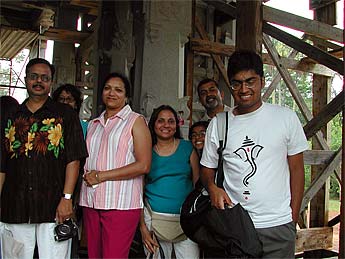
Krishna Ramachandran and his family beside one of the Bhadra pillars.
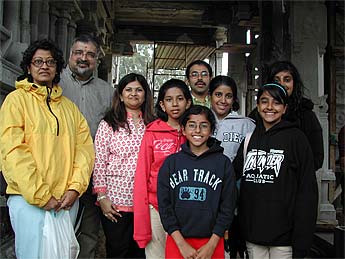
A light rain had begun to fall as we entered the temple site. Here is another group photo near the east-facing Gopuram. Everyone then had an opportunity to see all the wonderful stonework up close, ask questions, and talk to the silpis.
Raj and Himani Dave and family posed with Geeta and Raj Moolchandani with their children on the east side of the sanctum.
By the time we were leaving the rain had become torrential as we headed back to the Kadavul Temple.
Easan and Kartikeya Katir On Mission

Easan and his son Kartikeya are teaching at the annual summer camp held by the Pittsburg temple in Pennsylvania. We hope to get more news and photos later. Here he talks to a group outside during a break.
Saiva Siddhanta Church Wailua Mission

Our Wailua mission members are a small group, but they do a *lot* of Sivathondu!
Today’s series is a tree planting session. Sivakumaran Mardeemootoo and daughters, Amala Seyon, Durvasa and Isani Alahan, Lila Shaktidevi, and Tandu and Uma Sivanathan gather with a truckful of noni plants for Himalayan Acres. We are guessing that Kavita Mardemootoo is behind the camera.

This was a continuation of the planting from last Sunday when 500 plants or half the field was planted.

The trees are set in an eight inch deep hole every twelve feet. The row is a thousand feet long, and farmers’s advise when doing this kind of job, “Don’t look down the row at what you haven’t done…”

It’s a dirty job, but went very quickly and by 11:30, with the help of hired hand Augusto and his team, the work was done. Every little tree also got a handful of chicken manure. Today’s cloudy and rainy weather is also a big help as the trees adjust to their new home.

Dipanjali with a noni tree in a square tube, 2 inches by 2 inches by 8 inches. The trees were grown from seedlings in these open-bottom cardboard collars, which “air prune” the roots. As the roots grow down and hit air, they simply stop growing, unlike in a pot where they’ll tend to wrap around the bottom of the pot. When the trees are taken out of these collars, they transplant easily with little shock.
After the planting everyone enjoyed an outdoor picnic together by the Wailua River.
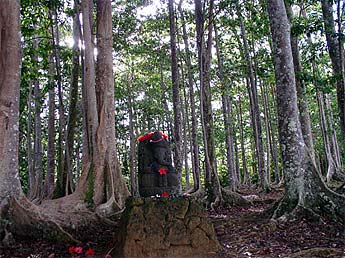
On another day the mission members harvested fresh Rudraksha seeds…
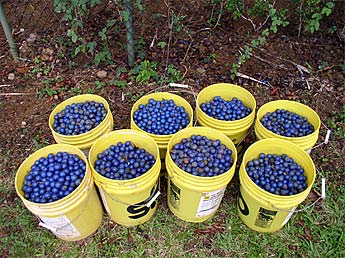
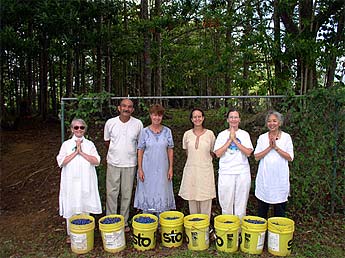
And there is visiting sishya, Indivar Sivanathan from California on the right.
Every purchase you make of rudrakshas lovingly harvest and processed by our devotees goes to support the Iraivan temple building fund. Click here to see what is available. Authentic and “fresh” from the sacred grows of San Marga.
From Our Gurus' Teachings
Archives are now available through 2001. Light colored days have no posts. 1998-2001 coming later.
